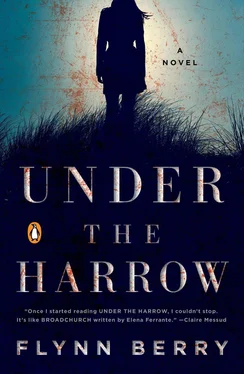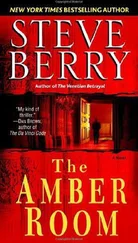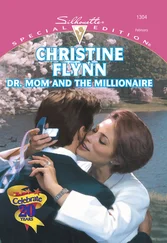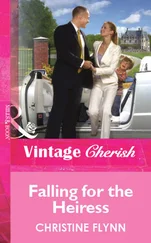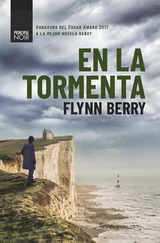• • •
The door to the kitchen is locked, and the girl isn’t at the front desk or in her room in the attic. I search on top of all the doorways for a key. I need to put the groceries in the fridge, and then I want to cook dinner.
The carrier bags strain at my arms and I am hungry and dizzy. Finally I open the back door and set the milk and eggs and cheese on one of the flagstones. The air isn’t too cold now, but it will drop to freezing in the night.
I wonder if I will still be able to use the milk after it thaws. I’m too embarrassed to return the groceries, but I don’t have any money and they cost ten pounds. I stare at them and it is too much for me, these absurd worries on top of the pain, and I start to howl with my jacket bunched in my mouth.
• • •
Instead of cooking pasta in the large, dim kitchen at the Hunters and possibly beginning to feel a sliver of normalcy, I drank whisky in bed and tried to fall asleep early.
Now the Emerald Gate and the chip shop are closed, and I am thinking of what I could have eaten if I were not so stupid. Wonton soup. Moo shu pancakes with plum sauce. Scallion dumplings.
I am so tired. Right now, if the detectives called and said, “We believe this to be hopeless. We’ve stopped looking,” I think I would be relieved.
IN THE MORNING, I drive to the café attached to a petrol station on the Bristol Road, a few miles outside Marlow. It looks like any other service station, but the food is delicious. I once asked Rachel why and she said, “Anders,” and pointed with her fork at a man in chef’s whites and a toque. I have nothing to eat at the Hunters. The milk did freeze overnight and shattered the bottle. I haven’t cleaned it up yet.
Wet countryside rolls away on either side of the Bristol Road. This is where the accident Rachel told me about happened, with Callum and his girlfriend, Louise. She worked at the café, he had probably driven out to collect her.
I pass a small white cross and, soon after, pull off the road. The service station sells Esso fuel, and its icon, a red globe, towers above the empty countryside. I wonder if Louise still works here. Rachel said she looked like me.
I laugh when I see Louise. We do resemble each other. I feel a loose, happy surge of familiarity and have to stop myself from wheeling toward her. She has brown hair to her shoulders and high, wide cheekbones. She even moves like me, quick and fidgety, and she also walks with her feet slightly turned out.
As I find a table, Louise goes outside for a cigarette. She smokes with one arm crossed over her stomach and the other elbow balanced on her wrist. She looks about twenty-five. She scratches her mouth with her thumb while the smoke ladders above her.
When she sees me, I think Louise notices the resemblance too. Her eyes crinkle and her mouth slopes to the side, as though she is stopping herself from pointing it out. She wears a navy shirt and a black canvas skirt with an apron over it. “What would you like?” she asks.
“Coffee and the ebelskiver, please.”
She smiles and takes the menu from me. When she sets the cup and saucer down a few minutes later, I look at her wrists and forearms in the strong light through the window. There are dark red marks on her arms, like cigarette burns, though I read once the same mark can be made with a screwdriver. Her chest and neck appear to have been lacerated or burned, leaving pale, crimped scars. One of her ears folds down. Some of the fingers on her right hand are knobby and stiff, as though they were broken once.
She doesn’t have to cover the scars anymore. Everyone will assume they’re from the crash.
“He beat her,” said Rachel. “When they came in after the collision they were both in bad shape, but none of her injuries came from the accident. They were too old. They came from him.”
• • •
That night, there are a few men inside the Duck and Cover. They must be doing a lock-in, it should have closed hours ago. The men inside the pub are laughing over the bar. One of them puts his face in his hands. Next to him, Keith shakes his head and raises a bottle to his mouth.
I settle on the bench in front of the town solicitor’s, across from the pub, and unwrap the plastic from a pack of cigarettes. I cup my hands around the match while I light one. Then I take out my phone and hunch over it, smoking. I force myself not to look up for a long time, and when I do Keith is staring at me through the window.
His face is blank, his mouth sagging. I don’t hold his gaze. I dial the number of my bank and hold the phone to my ear, still bowed over, still holding the lit cigarette. When I glance up again, the man next to Keith is looking at me too. He shrugs and turns back to the bar.
After another few minutes, I grind the cigarette under my boot and walk toward the common. The yews sound like there are waves seething through them, and I wait under them in case he will follow me. Above the yews, the clock strikes in the village hall, and I walk down Salt Mill Lane toward the memorial for Callum. All the candles are lit. The shrine is beautiful and shadowy, the candles pulling deep pools of scarlet from the flowers. Candlelight flickers on my face. I read the cards again, but I don’t find one from Louise.
When I return to the Hunters, the bar is unlocked, and I pull a club chair to the window facing the station.
I spent ten days here in June. The town was different then. It was like going to the beach, even though it’s farther inland than London. I walked around barefoot. I bicycled on Meeting House Lane. I made a blueberry slump. Rachel worked most of the time, but when she got home from the hospital she poured us both a glass of white wine and we carried them through the field behind her house and onto the aqueduct.
I remember her laughing at something, trying not to slop the wine from her glass as she threw a stick for Fenno. Greenfinches flew between the trees. The dog raised his paw in silhouette, like a dog from the unicorn tapestries, with the embroidered woods behind him. I remember thinking that this isn’t the newest moment in history but the oldest, that time isn’t thinning but thickening.
It is so easy to think about her. Each memory links to another one, and time doesn’t seem to pass at all. I sit for hours remembering, until the first commuters, unbearably sad, begin to arrive, waiting in the darkness on the platform for the early train to London.
I DRIVE TO the hospital to meet Joanna Cole. She and Rachel worked most of their shifts together, and Joanna may know whom she meant when Rachel said she was meeting a friend from the hospital.
The John Radcliffe is a short drive from Marlow, on the edge of Oxford. A teaching hospital, with the best surgeons and equipment. When I came to meet her once, Rachel dropped a vial in a plastic bag. She wrote something on a clipboard with a word near the top highlighted in pink.
“What’s the color mean?”
“Nothing. Obfuscation.”
“Really?”
“No.”
I watch the door to Accident and Emergency and wait for Rachel to come out, a winter coat wrapped over her scrubs, frowning, with dark circles under her eyes and her hair scraped back from her face. She liked to sit on a certain bench, facing away from the hospital. “I spend enough time inside it,” she said.
I wish I could tell her something I learned from the Thames Valley Police website, which is a rule that you have to report treasure. She would love that, like people were always finding treasure, like they would be stupid enough to report it if they did.
I try to imagine what Rachel would want to talk about if she were here. Lately she had been preoccupied with swimming. The logic seemed to be that she was so tired sleep wouldn’t even help anymore, only swimming.
Читать дальше
